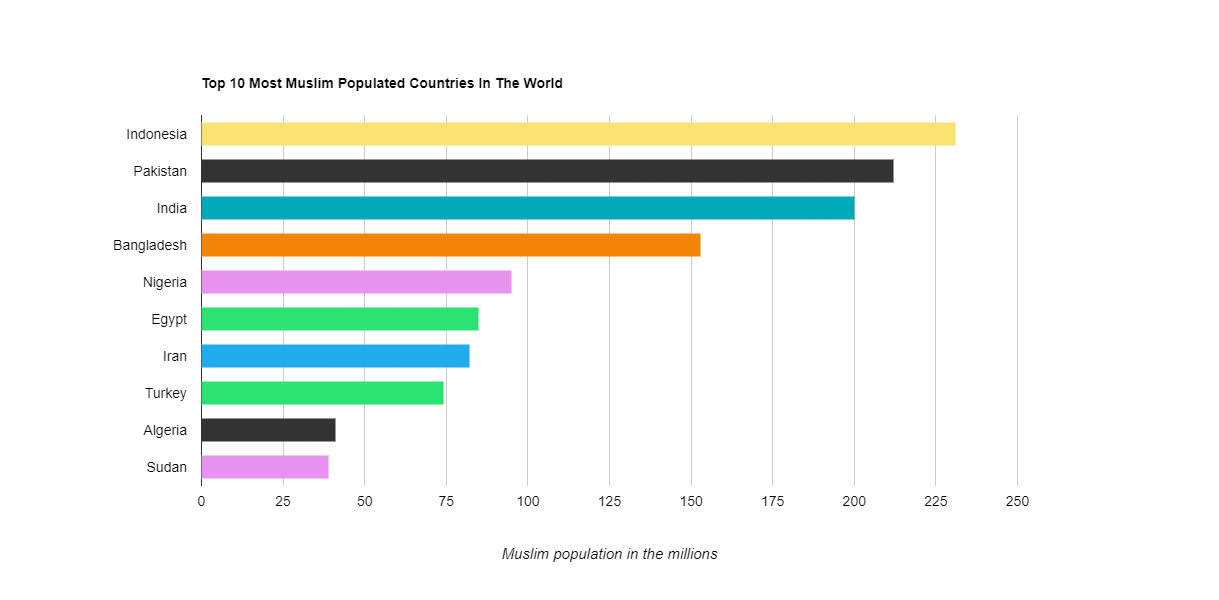As of 2023, there were an estimated 1.8 billion Muslims worldwide, making Islam the world’s second-largest religious group behind Christianity. You can head over directly to the Most Populated Christian Countries in the World. Yet according to the Pew Research Center, Islam is expanding quicker than any other major faith. Mentioned below are the most populated countries in the world.
1. Indonesia
According to a recent infographic from the Pew Research Center, Indonesia has the biggest Muslim population in the world (230 million). Around 13% of the world’s Muslims live in Indonesia, where Islam accounts for roughly 88% of the population. Indonesia is also in a list of Asian Countries.
2. Pakistan
From 1.6 billion in 2010, the global Muslim population is projected to grow to 2.2 billion in 2030, with Pakistan overtaking Indonesia as the most populated Muslim country. This research from the Pew Research Center in Washington, DC, predicts that the bulk of the world’s Muslims (about 60%) will continue to reside in Asia-Pacific. Nonetheless, with a projected population of 256 million in 2030 (up from the present 210 million), Pakistan is poised to overtake Indonesia as the nation with the highest Muslim population. Before 1971, when East Pakistan seceded and became Bangladesh, Pakistan was the biggest Muslim country.
3. India
According to the 2011 Indian Census, 14.2% of the country’s population, or around 200. million people, identified as Muslims. Muslims make up the third biggest religious minority in India, making it the third most populous Muslim nation worldwide. Over 87% of India’s Muslims belong to the Sunni sect, while the Shia only comprise about 13%. India is also in the list of most populated countries in the world.
4. Bangladesh
Bangladesh is a secular nation, where Islam is the official religion. According to a census taken in 2022, around 91.04% of Bangladesh’s total population of 165 million was Muslim. This equates to nearly 150 million Muslims. Sunnis are the majority in Bangladesh, and the Hanafi school of fiqh is the most widely practiced. Bangladeshi culture is deeply rooted in religion. Bangladesh has a Muslim majority, yet it is effectively a secular nation.
5. Nigeria
A nation in West Africa called Nigeria or the Federal Republic of Nigeria. When it comes to the total population, Nigeria ranks fifth globally. It is the world’s 32nd-biggest nation in terms of land area. Between 2022 and 2023, Nigeria’s population is projected to expand by 2.35 per cent. Its people account for 2.64 per cent of the global total. According to a survey conducted in 2010, 49.3% of Nigeria’s population was Christian, 48.8% was Muslim, and 1.9% was either religiously unaffiliated or practised a traditional religion not recognized by the state. Estimates from 2018 indicate that 53.5% of the population is Muslim, 45.9% is Christian (10.6% is Roman Catholic, 35.3% is some other form of Christianity), and 0.6% is some other religion.
6. Egypt
Ninety percent of Egyptians, or more than 80 million people, are Muslims. While all law schools are represented in Egypt, most Muslims are Sunni and adhere to the Maliki tradition. The number of Muslims who identify as Shia is rather modest. Egyptian Muslims subscribe to a broad range of religious and political tenets, from Sufism, which has a long and storied history of support in the country, to Salafism and beyond.
7. Iran
Large-scale persecution by Arab Muslims under the newly-arrived Rashidun Caliphate contributed to the downfall of Zoroastrianism among the Persian peoples after the Muslim invasion of Persia (633-654 CE), which brought about the fall of the Sasanian Empire. Islam has been the state religion of Iran (also known as “Persia”) since its creation after the 7th-century conquest, except during the Mongol invasions and subsequent founding of the Ilkhanate in the 13th century. The Islamic Revolution of 1979 toppled the ancient Persian monarchy and ushered in the Islamic Republic of Iran.
8. Turkey
While Islam is not the official state religion of Turkey, it is the most practiced faith in the nation. The nation has a rich Islamic heritage, having been ruled as a Sunni Islamic state by the Ottoman Empire for centuries. Incredible Islamic architecture and monuments can be found nationwide, testifying to the rich heritage of Islam in the region. Seventy percent or more of Turks are devout Sunni Muslims, while the other 25 percent practice Shi’a Islam, which includes the Alevi faith and certain less prevalent doctrines like the Sufi-worshipping whirling dervishes largely. Turkey is also in a list of European countries.
9. Algeria
Almost 98% of the people (more than 99% of the population that claim any religion) as of 2020 adhere to Sunni Islam of the Maliki school of law, making Islam the dominant religion in Algeria.
10 . Sudan
Since Sudan’s independence in 1956, Muslims have held most positions of power in the country’s government. The United Nations Development Programme estimates that most of Sudan’s population (97%) identifies as Muslim. Just 3% of the population does not identify as Christian or traditional animist.

Conclusion
There is a large Muslim community in the region, although the entire population is much smaller than in Asia.
FAQs –
● Which Muslim nation do you think is the most advanced?
With a GDP per capita of over US$133,357, Qatar is the world’s wealthiest nation.
● Which nation has no mosque?
Slovak Republic is the only EU country without a mosque. In 2000, a disagreement emerged over the Slovak Islamic Waqfs Foundation’s plans to construct an Islamic centre in the capital city of Bratislava.
